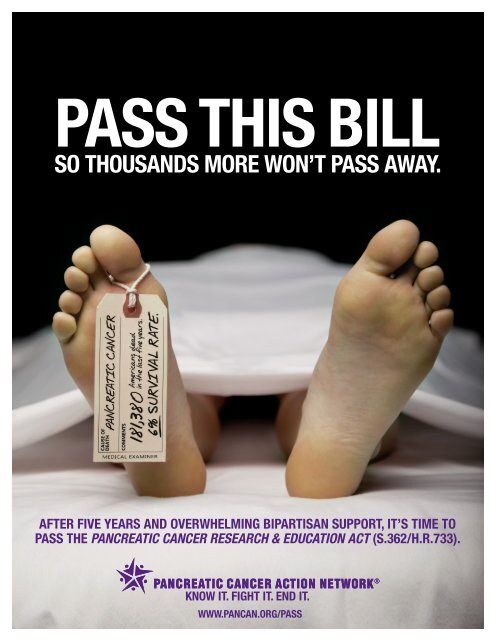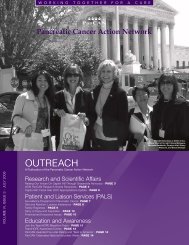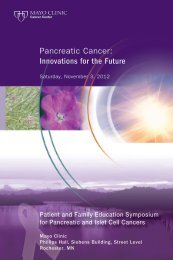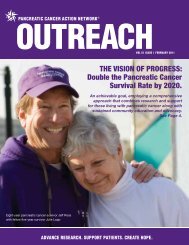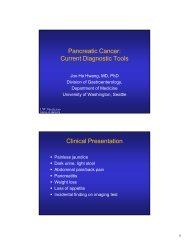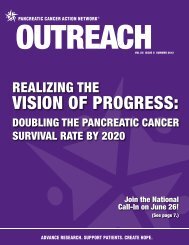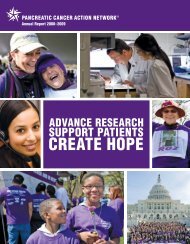Advocacy Day ad - Pancreatic Cancer Action Network
Advocacy Day ad - Pancreatic Cancer Action Network
Advocacy Day ad - Pancreatic Cancer Action Network
You also want an ePaper? Increase the reach of your titles
YUMPU automatically turns print PDFs into web optimized ePapers that Google loves.
PASS THIS BILL<br />
SO THOUSANDS MORE WON’T PASS AWAY.<br />
AFTER FIVE YEARS AND OVERWHELMING BIPARTISAN SUPPORT, IT’S TIME TO<br />
PASS THE PANCREATIC CANCER RESEARCH & EDUCATION ACT (S.362/H.R.733).
CONGRESS, IT’S TIME TO PASS<br />
THE PANCREATIC CANCER RESEARCH<br />
& EDUCATION ACT (S.362/ H.R.733).<br />
More than 181,000 Americans have died from pancreatic cancer in the five years since the <strong>Pancreatic</strong><br />
<strong>Cancer</strong> Research & Education Act was first introduced. The bill now has bro<strong>ad</strong> bi-partisan support, including<br />
half of the Senate; a majority of the House; a majority of the Senate Health, Education, Labor & Pensions<br />
Committee (HELP); a majority of the House Energy & Commerce Committee; more than 40 members of the<br />
Republican Study Committee; and approximately 20 members of the Tea Party. In fact, this bill has more<br />
co-sponsors and bi-partisan support than any other bill referred to the Senate HELP Committee and the<br />
House Energy & Commerce Committee this Congress.<br />
This bill is critical because pancreatic<br />
cancer is the only major cancer 1 that still<br />
has a five-year relative survival rate in the<br />
single digits at just six percent 2 . The survival<br />
rate is particularly alarming when you consider that<br />
the overall cancer survival rate is now 67 percent.<br />
The lack of progress in improving treatments for the<br />
nation’s fourth le<strong>ad</strong>ing cause of cancer-related death<br />
and tenth le<strong>ad</strong>ing cancer diagnosis is unacceptable.<br />
S. 362/H.R. 733 would spur progress for pancreatic<br />
cancer research by requiring the National<br />
<strong>Cancer</strong> Institute (NCI) to develop a long-term and<br />
comprehensive strategic plan for improving survival<br />
rates for the disease. Just like any business with a<br />
problem, the bill requires the NCI to bring together<br />
experts, identify the challenges, and propose<br />
solutions to <strong>ad</strong>dress the issue. The strategic plan<br />
would not only assist the NCI in understanding<br />
the gaps in pancreatic cancer research, but would<br />
also provide benchmarks against which research<br />
progress can be measured and help to bolster<br />
public-private partnerships. There is strong<br />
precedent for the approach outlined in the<br />
bill. Congress has authorized similar programs for<br />
diabetes, Alzheimer’s, autism and breast cancer.<br />
This bill does not dictate how the NCI should<br />
conduct pancreatic cancer research or<br />
award grants. The strategic plan and coordinating<br />
committee called for in the bill would provide<br />
guidance; final decisions would be left to the NCI.<br />
The legislation would provide accountability for<br />
limited taxpayer resources.<br />
This is not a disease-specific bill. It includes a<br />
recommendation that the NCI develop a new grant<br />
program to focus on the other de<strong>ad</strong>ly cancers. The<br />
program would be piloted with pancreatic cancer<br />
(the de<strong>ad</strong>liest major cancer), but could be expanded<br />
to include any cancer with a five-year survival rate<br />
below 50 percent, including brain, esophageal, liver,<br />
lung, myeloma, ovarian and stomach cancers.<br />
In <strong>ad</strong>dition, the bill recommends that the NCI expand<br />
the number of Specialized Programs of Research<br />
Excellence (SPORE) for pancreatic cancer and<br />
requires that the National Institutes of Health and<br />
the Centers for Disease Control and Prevention work<br />
with patient <strong>ad</strong>vocacy organizations to develop a<br />
toolkit for patients and a program to better educate<br />
primary care providers about pancreatic cancer.<br />
1<br />
“Major cancer” is defined as one tracked by both the<br />
American <strong>Cancer</strong> Society and the National <strong>Cancer</strong> Institute.<br />
2<br />
American <strong>Cancer</strong> Society. <strong>Cancer</strong> Facts & Figures 2012.<br />
Atlanta: American <strong>Cancer</strong> Society; 2012.<br />
CONGRESS HAS THE POWER TO CHANGE THIS DISMAL STATISTIC. A single-digit survival rate<br />
for one of our nation’s le<strong>ad</strong>ing cancer killers is unacceptable, especially given that overall cancer incidence and<br />
death rates are declining while the incidence of and death rate for pancreatic cancer have been increasing.<br />
The number of new pancreatic cancer cases is projected to increase by 55 percent between 2010 and 2030.<br />
We must act now to ensure that we have the tools we need to <strong>ad</strong>dress this current and impending crisis.<br />
PASS THIS BILL SO THOUSANDS MORE WON’T PASS AWAY.<br />
PANCREATIC CANCER ACTION NETWORK | GOVERNMENT AFFAIRS & ADVOCACY OFFICE<br />
1050 Connecticut Ave. NW, 10th Floor | Washington, DC 20036 | Ph: 202.742.6699 | Fx: 202.742.6518 | www.pancan.org/pass


